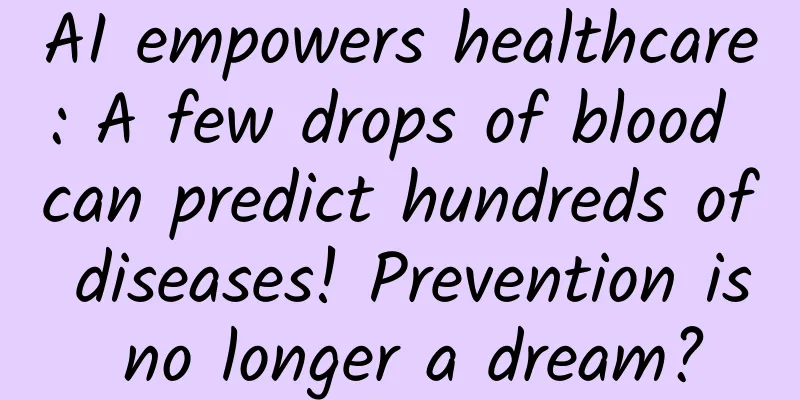AI empowers healthcare: A few drops of blood can predict hundreds of diseases! Prevention is no longer a dream?

|
With the rapid development of science and technology, artificial intelligence (AI) is no longer a distant future technology, but a reality deeply integrated into our daily lives. From smart homes to autonomous driving, AI's application scenarios are becoming more and more extensive. It is worth noting that AI has also set off a revolution in the field of medical health. Recently, a major breakthrough by the research team of Fudan University - using AI technology to predict hundreds of diseases with a few drops of blood, this has undoubtedly opened up a new path for early screening and prevention of diseases. This technology is not only easy to operate, but also low-cost, bringing unprecedented protection to public health. With the help of big data and advanced AI algorithms, the research team of Fudan University has successfully mapped the proteome of human health and disease. As the basic unit of life activities, abnormal changes in proteins often indicate the occurrence of diseases. By deeply analyzing these changes, researchers can predict disease risks in advance. When processing huge amounts of protein data, AI algorithms can accurately identify tiny disease signals, thereby discovering potential risks in the early stages of the disease, even in the stage without obvious symptoms, and buying valuable treatment time for patients. Yu Jintai, deputy director of the Fudan University Research Institute and deputy director of the Department of Neurology at Huashan Hospital affiliated to Fudan University, said that by detecting changes in proteins through blood tests and using AI to calculate the signs of disease, signs of diseases such as Alzheimer's disease can be discovered as early as 15 years in advance. Traditional disease detection methods can usually only confirm the disease after symptoms appear, but at this time the disease is often more serious. In contrast, AI disease early screening technology uses intelligent algorithms to conduct a detailed analysis of nearly 3,000 proteins in the blood, which can detect potential risks in the early stages of the disease and predict hundreds of diseases such as heart disease, diabetes, and Alzheimer's disease more than ten years in advance. This early detection not only improves the treatment effect, but also significantly reduces medical costs and reduces the economic burden on society and individuals. In addition, the advantage of AI disease early screening technology lies in its wide range of disease coverage, which can predict a variety of diseases, including some that are difficult to diagnose early. With the continuous learning and optimization of AI algorithms, the accuracy of detection is also continuously improving, providing patients with more reliable health protection. The emergence of AI disease early screening technology has not only improved the efficiency and accuracy of disease detection, but also triggered a shift from treatment-oriented to prevention-oriented in the medical field. The traditional medical model often diagnoses and treats diseases after they occur, while AI technology moves the line of defense against diseases forward, achieving true prevention first. This shift not only helps improve the public's health level, but also effectively alleviates the shortage of medical resources. The application prospects of AI disease early screening technology are broad. As the technology continues to mature and become more popular, it is expected to become part of routine physical examinations in the future, helping people to detect health problems in a timely manner and take corresponding preventive measures. At the same time, this technology also provides new possibilities for personalized medicine. By analyzing individual protein data, health management and treatment plans can be tailored for each person. Although AI disease early screening technology has many advantages, its development still faces some challenges. For example, how to ensure the privacy and security of data, how to increase public acceptance of this new technology, and how to continuously optimize algorithms and improve detection efficiency in practical applications. These issues require the joint efforts of scientific researchers, medical institutions and government departments to jointly promote the healthy development of AI technology in the medical field. AI disease early screening technology is undoubtedly a major breakthrough in the medical field. With its advantages of early detection, comprehensive coverage, and prevention first, it provides a new perspective and method for disease screening and prevention. With the continuous advancement of technology and the popularization of its application, we have reason to believe that AI disease early screening technology will usher in a new era of health, allowing more people to enjoy the health and well-being brought by technology. Information reference source: CCTV News |
>>: Is your child's myopia increasing rapidly? These 5 methods can remedy it!
Recommend
Will your skin really become darker if you eat too much soy sauce?
Hello, this is Science Popularization China. What...
Post-weaning breast hyperplasia
Postpartum women generally choose to breastfeed b...
Most of these 9 diseases found during physical examinations do not need to be treated! Don’t scare yourself
Xiaoliang (pseudonym) works for a foreign company...
Symptoms and pictures of abnormal leucorrhea
Women may suffer from many gynecological diseases...
How to enjoy the West Lake in Hangzhou in one day? Is one day enough to enjoy the West Lake in Hangzhou?
West Lake is a famous scenic spot in Hangzhou and...
What are the symptoms of pregnancy? Are you affected?
Many women are pregnant but do not discover it ea...
The harm after abortion
Perhaps in the eyes of most young people, abortio...
How to dice chicken breast? Calories of boiled chicken breast
Chicken breast is tender, delicious, and low in f...
Six tips to help you relieve your irritability during menstruation
It is well known that many women have mood swings...
What causes brown discharge before menstruation?
I believe everyone knows the importance of menstr...
Is frequent fetal movement at 21 weeks a sign of hypoxia?
Nowadays, the problem of air pollution has become...
What are the symptoms of threatened miscarriage in early pregnancy?
Bad living habits and eating habits are prevalent...
What tea is the fastest way to lose weight on your legs? These four are preferred
Many women want to have slender and white legs, s...
What is the cause of the cold stomach?
Women need care, because the female body is much ...
Cervicitis infusion is the best
Female friends must not take cervicitis lightly, ...









